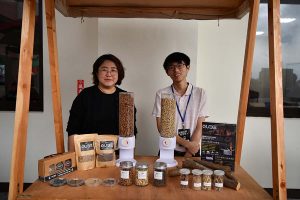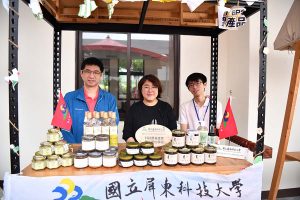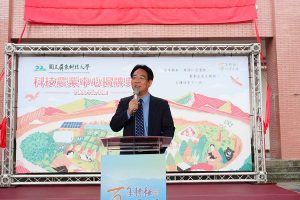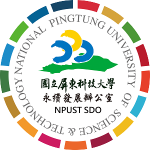NPUST was founded on agriculture science and has been continuously innovating in related areas of study for the past one hundred years. And now, in order to further promote “agricultural value-added” and “cross-field talent cultivation”, NPUST has built a Center for Technological Agriculture, which officially opened at 9:30 am on the school’s 100th anniversary, November 16, 2024. NPUST President Chin-Lung Chang, Director of the Taiwan Agricultural Research Institute (Ministry of Agriculture) Jeng-Fang Huang, and Academia Sinica research fellows Chang-Hung Chou, Ching T. Hou, I Chiu Liao, and Gwo-Ching Chang jointly participated in the plaque unveiling.
The Center for Technological Agriculture is composed of three major units: Office of Continuing and Extension Education, the Smart Agriculture Center, and the Bachelor Program of Agricultural Technology. The Bachelor Program is a publicly funded program in agriculture that trains agricultural management talent. It covers farming, aquaculture, animal husbandry, food science and management, combining academic and practical coursework so that students can immediately apply what they learn. The Office of Continuing and Extension Education provides professional technical training courses for the agriculture, engineering and business. It is combined with community services to enhance competitive advantages and promote industrial upgrading. The Smart Agriculture Center uses forward-looking technology to promote “smart” production and market integration, and enhance added-value techniques. The Center for Technological Agriculture will play a supportive role by working to integrate the experimental research, extension services and educational activities of the three bodies with hopes of cultivating cross-domain talent and enabling Taiwan’s agriculture industry to stride into the “Smart era”.
Serving as both a window for external promotion and a facility for professional training, the spatial design of the center takes both of these needs into consideration. The goal was to establish an incubation base and creative space which will encourage student innovation, creativity and entrepreneurship. This incubation base brings together on-campus resources to provide a space where students can receive technical assistance as they work to develop their business plans and turn their ideas into products. A team of professional consultants at the center will provide students with advice on finances, management, intellectual property and business related issues.
On top of this, in order to promote “life-long learning” and provide a healthy, happy, independent and dignified learning environment for senior-citizen students enrolled in the University for Seniors, special training classrooms have also been designed for the center. In this way the center will be able to further serve as an interactive platform that allows different generations to share knowledge and learn together.














